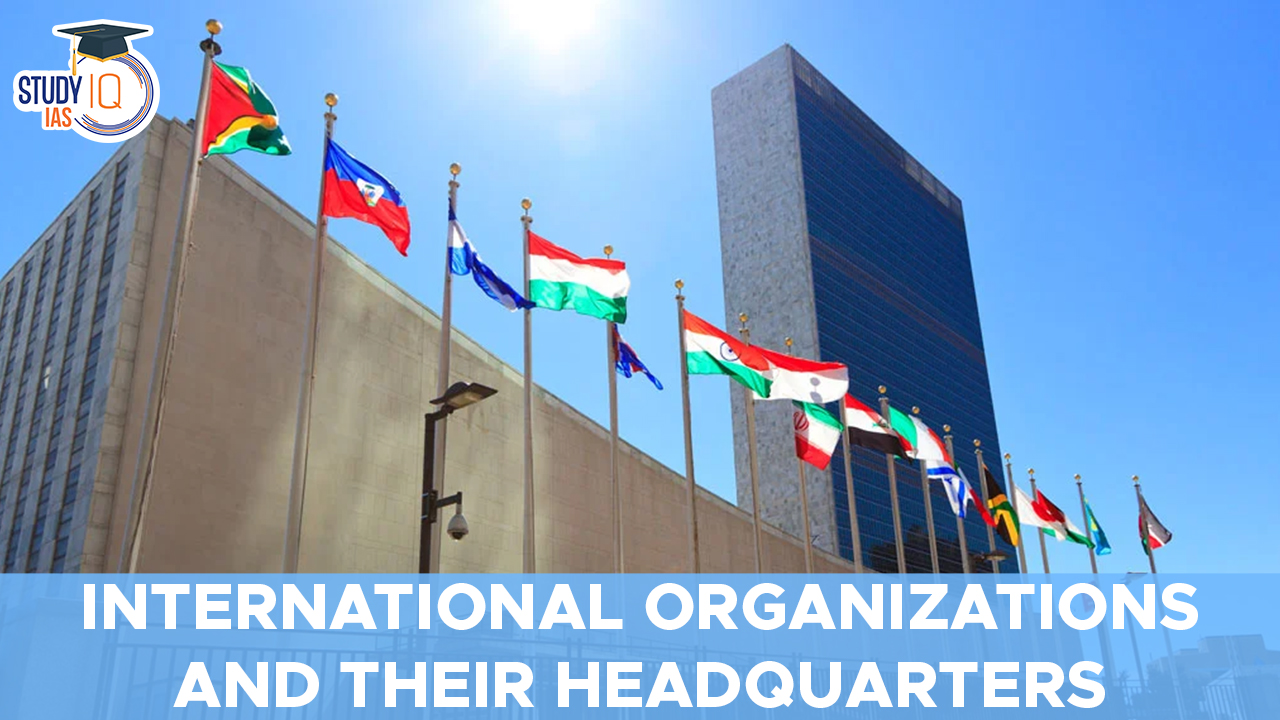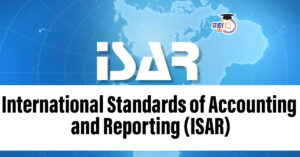Table of Contents
International organizations (IOs) are established through treaties and have a distinct legal identity under international law. They are formed by member states to work together on shared goals, including maintaining peace, promoting economic stability, addressing global challenges, and supporting development. The concept of international organizations dates back to the Peace of Westphalia in 1648, but the modern framework began with the Congress of Vienna (1814–1815) and the establishment of the League of Nations in 1920. Today, international organizations play a critical role in global governance, fostering cooperation among nations and addressing complex international issues. Examples of major international organizations include the United Nations (UN), the World Health Organization (WHO), and the International Monetary Fund (IMF).
International Organizations and Their Headquarters
An international organization is a group of countries that work together to promote cooperation and support each other. They aim to improve the well-being of their member nations and help maintain peace. These organizations also provide funding to support development in less wealthy countries.
International Organizations and their Headquarters are a very important topic for any competitive examinations like UPSC, State PSC etc. So, we are providing a complete list of the international organizations and their headquarters fully.
Read about: Countries and Capitals
Types and Purpose of Intergovernmental Organizations (IGOs)
Intergovernmental organizations (IGOs) are structured around treaties that define their purpose, functions, and membership. They serve as platforms for diplomatic engagement, conflict resolution, and policy-making. IGOs can be categorized into different types based on their scope and objectives:
- Global Organizations: Open to all nations, such as the United Nations and the World Health Organization.
- Regional Organizations: Focused on specific geographical regions, like the European Union (EU) and the African Union (AU).
- Economic Organizations: Promoting trade and financial stability, including the World Trade Organization (WTO) and the International Monetary Fund (IMF).
- Cultural and Educational Organizations: Aimed at promoting education and cultural exchange, such as UNESCO and the United Nations University (UNU).
- Health and Humanitarian Organizations: Addressing health crises and humanitarian issues, such as WHO and the Red Cross.
History of International Organizations
The development of international organizations has been shaped by key historical events:
- Peace of Westphalia (1648): Established the concept of state sovereignty.
- Congress of Vienna (1814–1815): Created a diplomatic framework for resolving conflicts.
- International Telecommunication Union (1865): The oldest international organization with a permanent secretariat.
- League of Nations (1920): First global organization aimed at maintaining peace, but it dissolved in 1946.
- United Nations (1945): Founded after World War II to promote peace, security, and cooperation.
Since the 1940s, the number of IGOs has grown steadily, reflecting the increasing complexity of global challenges and the need for coordinated international responses.
List of International Organizations and Their Headquarters
Every international organization has a significant role to maintain peace, harmony and stability around the world. So, it is important to be aware of these organizations. Here is the complete list of the International Organizations and their Headquarters.
| International Organizations | Headquarter |
|---|---|
| United Nations Organization (UNO) | New York, USA |
| United Nations Environment Programme (UNEP) | Nairobi, Kenya |
| United Nations High Commission for Refugees (UNHCR) | Geneva, Switzerland |
| United Nations Development Programme (UNDP) | New York, USA |
| United Nations Population Fund (UNFPA) | New York, USA |
| United Nations Educational Scientific and Cultural Organization (UNESCO) | Paris, France |
| World Health Organization (WHO) | Geneva, Switzerland |
| International Monetary Fund (IMF) | Washington D.C., USA |
| Commonwealth of Nations | London, United Kingdom |
| Organisation of Petroleum Exporting Countries (OPEC) | Vienna, Austria |
| World Wildlife Fund (WWF) | Gland, Switzerland |
| United Nations Conference on Trade and Development (UNCTAD) | Geneva, Switzerland |
| International Olympic Committee (IOC) | Lausanne, Switzerland |
| League of Arab States | Cario, Egypt |
| Amnesty International | London, United Kingdom |
| Asian Development Bank | Manila, Philippines |
| Association of South-East Asian Nations (ASEAN) | Jakarta, Indonesia |
| North Atlantic Treaty Organisation (NATO) | Brussels, Belgium |
| African Union (AU) | Addis-Ababa, Ethiopia |
| South Asian Association for Regional Corporation (SAARC) | Kathmandu, Nepal |
| International Police (INTERPOL) | Lyons, France |
| World Trade Organization (WTO) | Geneva, Switzerland |
| Women Aid International | London, United Kingdom |
| World Bank | Washington D.C., USA |
| Universal Postal Union | Bern, Switzerland |
| BENELUX Economic Union | Brussels, Belgium |
| General Agreement on Tariffs and Trade (GATT) | Geneva, Switzerland |
| United Nations Children’s Emergency Fund (UNICEF) | New York, USA |
| UN Women | New York, USA |
| International Labour Organization (ILO) | Geneva, Switzerland |
| United Nations Security Council (UNSC) | New York, USA |
| International Committee of the Red Cross | Geneva, Switzerland |
| International Organization for Standardization | Geneva, Switzerland |
| Organization for Economic Cooperation and Development (OECD) | Paris, France |
| World Meteorological Organization (WMO) | Geneva, Switzerland |
| Joint United Nations Programme on HIV/AIDS (UNAIDS) | Geneva, Switzerland |
| International Atomic Energy Agency (IAEA) | Vienna, Austria |
| Food and Agricultural Organization (FAO) | Rome, Italy |
| World Intellectual Property Organization (WIPO) | Geneva, Switzerland |
| Transparency International | Berlin, Germany |
| Organization of Islamic Cooperation | Jeddah, Saudi Arabia |
| Worldwide Fund for Nature (WWF) | Gland, Switzerland |
| United Nations Industrial Development Organization (UNIDO) | Vienna, Austria |
| International Maritime Organisation (IMO) | London, United Kingdom |
| International Renewable Energy Agency | Abu Dhabi, UAE |
| Organization for the Prohibition of Chemical Weapons | The Hague, Netherlands |
| International Council on Monuments and Sites (ICOMOS) | Paris, France |
| Asia-Pacific Economic Cooperation (APEC) | Queenstown, Singapore |
| International Union of Pure and Applied Chemistry | North Carolina |
| World Economic Forum | Cologny-Geneva, Switzerland |
| Indian Ocean Rim Association for Regional Cooperation | Ebene, Mauritius |
| United Nations Interregional Crime and Justice Research Institute (UNICRI) | Turin, Italy |
| International Telecommunication Union (ITU) | Geneva, Switzerland |
| International Civil Aviation Organization (ICAO) | Montreal, Canada |
| United Nations University (UNU) | Tokyo, Japan |
| International Union for Conservation of Nature (IUCN) | Gland, Switzerland |
| United Nations Office on Drugs and Crime (UNODC) | Vienna, Austria |
| UN-OHRLLS | New York, USA |
| United Nations Human Settlement Programme (UN-Habitat) | Nairobi, Kenya |
| International Fund for Agricultural Development (IFAD) | Rome, Italy |
| United Nations World Tourism Organization (UNWTO) | Madrid, Spain |
| UN Office for Disaster Risk Reduction (UNDRR) | Geneva, Switzerland |
| Office of the High Commissioner for Human Rights (OHCHR) | Geneva, Switzerland |
| United Nations Institute for Disarmament Research (UNIDIR) | Geneva, Switzerland |
| United Nations Institute for Training and Research (UNITAR) | Geneva, Switzerland |
| United Nations Relief and Works Agency for Palestine Refugees (UNRWA) | Amman, Jordan |
| International Court of Justice (ICJ) | The Hague, Netherlands |
| World Food Programme (WFP) | Rome, Italy |
| International Organization for Migration (IOM) | Geneva, Switzerland |
| United Nations System Staff College (UNSSC) | Turin, Italy |
| United Nations Office for Project Services (UNOPS) | Copenhagen, Denmark |
| United Nations Framework Convention on Climate Change (UNFCCC) | Bonn, Germany |
| Arctic Council | Tromso, Norway |
| African Development Bank Group | Abidjan, Cote d’Ivoire |
| International Trade Centre (ITC) | Geneva, Switzerland |
| Andean Community | Lima, Peru |
| Association of Caribbean States (ACS) | Port of Spain, Trinidad, Tobago |
| Bank for International Settlements (BIS) | Basel, Switzerland |
| International Solar Alliance (ISA) | Gurugram, India |
| Black Sea Economic Cooperation (BSEC) | Istanbul, Turkey |
| Caribbean Community (CARICOM) | Georgetown, Guyana |
| Council of Europe | Strasbourg, France |
| Council of European Municipalities and Regions (CEMR) | Geneva, Switzerland |
| Central American Bank for Economic Integration | Tegucigalpa, Honduras |
| Common Market for Eastern and Southern Africa (COMESA) | Lusaka, Zambia |
| Council of the Baltic Sea States (CBSS) | Stockholm, Switzerland |
| European Bank for Reconstruction and Development (EBRD) | London, United Kingdom |
| European Free Trade Association (EFTA) | Geneva, Switzerland |
| Economic Community of West African States (ECOWAS) | Federal Capital Territory, Nigeria |
| European Central Bank (ECB) | Frankfurt, Germany |
| European Space Agency (ESA) | Paris, France |
| Association of European Parliamentarians with Africa (AWEPA) | Amsterdam, Netherlands |
| European Union (EU) | Brussels, Belgium |
| Group of Eight (G8) | New York, USA |
| G-15 Summit | Geneva, Switzerland |
| Intergovernmental Authority on Development (IGAD) | Djibouti, Djibouti |
| International Chamber of Commerce (ICC) | Paris, France |
| Inter-American Development Bank (IDB) | Washington, DC, USA |
| International Development Association (IDA) | Washington, DC, USA |
| International Finance Corporation (IFC) | Washington, DC, USA |
| International Peace Bureau (IPB) | Geneva, Switzerland |
| International Federation of Red Cross and Red Crescent Societies (IFRC) | Geneva, Switzerland |
| International Seabed Authority (ISA) | Kingston, Jamaica |
| International Service for Human Rights (ISHR) | Geneva, Switzerland |
| Inter-Parliamentary Union | Geneva, Switzerland |
| Multilateral Investment Guarantee Agency (MIGA) | Washington, DC, USA |
| The Non-Aligned Movement (NAM) | Central Jakarta, Indonesia |
| Organization for Security and Co-operation in Europe (OSCE) | Vienna, Austria |
| Organization of Arab Petroleum Exporting Countries (OAPEC) | Kuwait, Middle East |
| World Organization Against Torture (OMCT) | Geneva, Switzerland |
| Secretariat of the Pacific Community (SPC) | Noumea, New Caledonia |
| Nordic Council of Ministers | Copenhagen, Denmark |
| Unión Latina | Paris, France |
| United Nations Economic and Social Commission for Western Asia (ESCWA) | Beirut, Lebanon |
| United Nations Economic and Social Commission for Asia and the Pacific (ESCAP) | Bangkok, Thailand |
| United Cities & Local Governments (UCLG) | Barcelona, Spain |
| United Nations International Research and Training Institute for the Advancement of Women (INSTRAW) | Santo Domingo, Dominican Republic |
| United Nations Office for the Coordination of Humanitarian Affairs (OCHA) | Geneva, Switzerland and New York City, USA |
| Western European Union (WEU) | Paris, France |
| World Federation of United Nations Associations (WFUNA) | Geneva, Switzerland and New York City, USA |
Read about: Gallantry Awards in India
List of International Organizations in which India is a Member Country
India has a strong international presence and the potential to become a superpower. India is becoming a significant ally in international issues. It has served as an active participant in many international organisations and has been a founding member of some International Organizations. International Solar Alliance is the First International and Inter-Governmental Organization to have a Headquarters in India with the United Nations as a Strategic Partner.
Check out the list of all the international organizations that India is a part of, whether as a founding member or a member country.
| International Organization | Headquarters | Year of Foundation |
| Asian-African Legal Consultative Organization (AALCO) | New Delhi | 1956 |
| Asian Development Bank (ADB) | Manila, Philippines | 1956 |
| African Development Bank (non-regional members) | Tunis, Tunisia | 1964 |
| Australia Group | Brussels, Belgium | 1985 |
| Association of Southeast Asian Nations (ASEAN Regional Forum) | Jakarta, Indonesia | 1967 |
| Bay of Bengal Initiative for Multi-Sectoral Technical and Economic Cooperation (BIMSTEC) | Dhaka, Bangladesh | 1997 |
| Bank for International Settlements (BIS) | Basel, Switzerland | 1930 |
| BRICS – Brazil, Russia, India, China, and South Africa | Shanghai, China | 2006 |
| Commonwealth of Nations | London, UK | 1931 |
| European Organization for Nuclear Research | Geneva, Switzerland | 1954 |
| Colombo Plan | Colombo, Srilanka | 1950 |
| East Asia Summit (EAS) | Colombo, Sri Lanka | 1950 |
| Food and Agriculture Organization (FAO) | Rome, Itlay | 1945 |
| G-15 – Group of 15 | Geneva, Switzerland | 1989 |
| G-20 – Group of 20 | Cancun, Mexico | 1999 |
| G-77 – Group of 77 | New York | 1964 |
| International Atomic Energy Agency (IAEA) | Vienna, Austria | 1957 |
| International Bank for Reconstruction and Development (IBRD – World Bank) | Washington DC, US | 1944 |
| International Civil Aviation Organization (ICAO) | Montreal, Canada | 1944 |
| International Chamber of Commerce | Paris, France | 1919 |
| International Development Association | Washington DC | 1950 |
| International Energy Agency | Paris, France | 1974 |
| International Fund for Agricultural Development | Rome, Italy | 1977 |
| International Finance Corporation | Washington DC, US | 1956 |
| International Labour Organization | Geneva, Switzerland | 1919 |
| International Monetary Fund | Washington DC, US | 1945 |
| International Maritime Organization | London, UK | 1948 |
| International Mobile Satellite Organization | London, UK | 1999 |
| International Criminal Police Organization | Lyon, France | 1923 |
| International Olympic Committee | Lausanne, Switzerland | 1894 |
| International Partnership for Energy Efficiency Cooperation | Paris, France | 2009 |
| International Organization for Standardization | Geneva, Switzerland | 1947 |
| International Telecommunications Satellite Organization | Washington DC | 1964 |
| International Telecommunication Union | Geneva, Switzerland | 1864 |
| International Solar Alliance | Gurugram, India | 2015 |
| International Trade Union Confederation (the successor to ICFTU (International Confederation of Free Trade Unions) and the WCL (World Confederation of Labour)) | Brussels, Belgium | 2006 |
| Missile Technology Control Regime (MTCR) | Japan | 1987 |
| Non-Aligned Movement (NAM) | Jakarta, Indonesia | 1961 |
| Organisation for the Prohibition of Chemical Weapons (OPCW) | Hague, Netherland | 1997 |
| Permanent Court of Arbitration (PCA) | Hague, Netherland | 1899 |
| Pacific Islands Forum (partner) | Suva, Fiji | 1971 |
| South Asian Association for Regional Cooperation (SAARC) | Kathmandu, Nepal | 1985 |
| South Asia Co-operative Environment Programme | Colombo, Sri Lanka | 1982 |
| Shanghai Cooperation Organization (SCO) | Beijing, China | 1996 |
| United Nations Organization (UNO) | New York | 1945 |
| United Nations Programme on HIV/AIDS (UNAIDS) | New York | 1994 |
| United Nations Educational, Scientific and Cultural Organization (UNESCO) | London, UK | 1946 |
| World Health Organization (WHO) | Geneva, Switzerland | 1948 |


 Ambedkar Jayanti 2025: Biography, Legacy...
Ambedkar Jayanti 2025: Biography, Legacy...
 International Standards of Accounting an...
International Standards of Accounting an...
 150th Summit of Inter-Parliamentary Unio...
150th Summit of Inter-Parliamentary Unio...





















